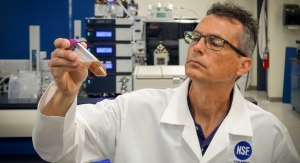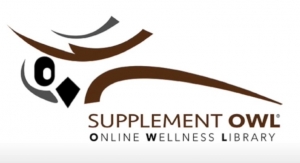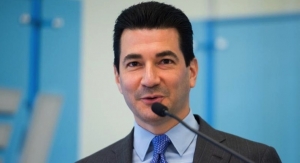10.04.16
The Council for Responsible Nutrition’s (CRN) Board of Directors recently got its first behind-the-scenes look at the progress of the Supplement OWL—the industry-wide dietary supplement product registry—a self-regulatory initiative intended to help create a more complete picture of the industry for various stakeholders interested in a one-stop shop to examine, evaluate, and compare product labels.
As part of a presentation by UL, co-developers of the product registry, CRN’s Board got a glimpse at the evolving product, as companies continue to provide beta-testing feedback. On Thursday, Oct. 27, attendees at The Conference—both CRN members and non-members—will get a similar look at the Supplement OWL as CRN continues to work toward the Nov. 1 deadline, the targeted soft launch date for all companies to begin inputting their labels.
According to Duffy MacKay, ND, senior vice president, scientific and regulatory affairs, CRN, “We are impressed by how far this project has come in such a short time. CRN has proudly taken a leadership role, but more importantly, this is truly a case of the industry coming together for the greater good. A whole range of dedicated companies have been engaging in about two years of discussion, perseverance and fortitude to get us to where we are today.”
The Vitamin Shoppe was among the first retailers to require its vendors to supply their labels to the NIH’s Office of Dietary Supplements (ODS) label database. Discussions of an industry-sponsored, but publicly available, collection of product labels originally bubbled up over two years ago in response to federal legislation that would have mandated an FDA-run registration for dietary supplements. Then, following concerns raised by the New York State Attorney General’s office in February 2015, new attention was focused on an industry-run initiative.
CRN’s president and CEO, Steve Mister, said, “The AG’s actions, although wrong-headed, put the industry on notice. Multiple thought leaders within the industry began to take a good, long look at ourselves and ask where we needed to improve, strengthen, and, quite frankly, mature.” Not only was CRN’s Board having those types of conversations, but similar discussions, spearheaded by long-time industry veterans like Tom Aarts, Nutrition Capital Network, and Mark LeDoux, Natural Alternatives International, were taking place at the NBJ Summit, at CEO dinners at trade shows, at other venues, and by other trade associations. Companies like GNC, Herbalife and Pharmavite quickly emerged as a trio of influencers, among others, urging their colleagues and competitors to seize this opportunity to advance the industry’s credibility, according to Mr. Mister.
One of the most prominent companies seeking change was GNC, which was among the first and consistently strong voices to recognize the value of a product registry, providing both an inspirational vision and a roll-up-your-sleeves approach to get companies interested and stay interested. “Throughout this process,” said Dr. MacKay, “GNC, and specifically Guru Ramanathan, PhD, have pushed a sense of urgency for this project, and were steadfast in their commitment to make it happen, despite facing some companies who were complacent to maintain the status quo.” GNC has continued to delve into the mechanics of the searchable registry, offering suggestions for technical improvements, test-driving the early versions with its own labels, and expressing strong support among the many vendors in its stores, Dr. MacKay said.
Pharmavite was another early adopter, recognizing that, until the industry did more to separate those companies willing to walk the extra miles of self-regulation from those companies not even following the numerous laws on the books, the industry would continue to be vulnerable to criticism. Christine Burdick-Bell has been an impactful force moving the project forward, while Paul Bolar, with his 40 years of regulatory expertise, has helped turn the vision into a pragmatic approach, making sure that path forward was executable.
From Herbalife, the project is fortunate to have the contributions of Bill Frankos, PhD, formerly FDA’s director, dietary supplement programs, who was consistent in reminding those working on the project to make it meaningful for FDA, understanding what would be helpful to the regulatory agency, and encouraging CRN to maintain an open dialogue with FDA throughout the process.
CRN also credits the 15 companies who have participated in CRN’s Transparency Working Group on the Supplement OWL as well as its Board of Directors Chairman Harvey Kamil, NBTY, who managed the initiative at the Board level, ensuring that the Supplement OWL received priority staff and funding resources. Mr. Mister stated, “Harvey has been instrumental to ensuring our Board had sufficient information to appreciate the vision and to move the initiative forward in small steps, so that progress wasn’t halted by differing opinions. Our companies have learned that it’s better to do something by consensus rather than allowing minor differences to create roadblocks. Not every company got exactly what it was looking for from the project, but every company recognized that ‘the perfect could become the enemy of the good.’ The Supplement OWL is more than good; it’s an important step forward for our industry, and I’m proud of all the companies that have a footprint in making it come to fruition.”
As part of a presentation by UL, co-developers of the product registry, CRN’s Board got a glimpse at the evolving product, as companies continue to provide beta-testing feedback. On Thursday, Oct. 27, attendees at The Conference—both CRN members and non-members—will get a similar look at the Supplement OWL as CRN continues to work toward the Nov. 1 deadline, the targeted soft launch date for all companies to begin inputting their labels.
According to Duffy MacKay, ND, senior vice president, scientific and regulatory affairs, CRN, “We are impressed by how far this project has come in such a short time. CRN has proudly taken a leadership role, but more importantly, this is truly a case of the industry coming together for the greater good. A whole range of dedicated companies have been engaging in about two years of discussion, perseverance and fortitude to get us to where we are today.”
The Vitamin Shoppe was among the first retailers to require its vendors to supply their labels to the NIH’s Office of Dietary Supplements (ODS) label database. Discussions of an industry-sponsored, but publicly available, collection of product labels originally bubbled up over two years ago in response to federal legislation that would have mandated an FDA-run registration for dietary supplements. Then, following concerns raised by the New York State Attorney General’s office in February 2015, new attention was focused on an industry-run initiative.
CRN’s president and CEO, Steve Mister, said, “The AG’s actions, although wrong-headed, put the industry on notice. Multiple thought leaders within the industry began to take a good, long look at ourselves and ask where we needed to improve, strengthen, and, quite frankly, mature.” Not only was CRN’s Board having those types of conversations, but similar discussions, spearheaded by long-time industry veterans like Tom Aarts, Nutrition Capital Network, and Mark LeDoux, Natural Alternatives International, were taking place at the NBJ Summit, at CEO dinners at trade shows, at other venues, and by other trade associations. Companies like GNC, Herbalife and Pharmavite quickly emerged as a trio of influencers, among others, urging their colleagues and competitors to seize this opportunity to advance the industry’s credibility, according to Mr. Mister.
One of the most prominent companies seeking change was GNC, which was among the first and consistently strong voices to recognize the value of a product registry, providing both an inspirational vision and a roll-up-your-sleeves approach to get companies interested and stay interested. “Throughout this process,” said Dr. MacKay, “GNC, and specifically Guru Ramanathan, PhD, have pushed a sense of urgency for this project, and were steadfast in their commitment to make it happen, despite facing some companies who were complacent to maintain the status quo.” GNC has continued to delve into the mechanics of the searchable registry, offering suggestions for technical improvements, test-driving the early versions with its own labels, and expressing strong support among the many vendors in its stores, Dr. MacKay said.
Pharmavite was another early adopter, recognizing that, until the industry did more to separate those companies willing to walk the extra miles of self-regulation from those companies not even following the numerous laws on the books, the industry would continue to be vulnerable to criticism. Christine Burdick-Bell has been an impactful force moving the project forward, while Paul Bolar, with his 40 years of regulatory expertise, has helped turn the vision into a pragmatic approach, making sure that path forward was executable.
From Herbalife, the project is fortunate to have the contributions of Bill Frankos, PhD, formerly FDA’s director, dietary supplement programs, who was consistent in reminding those working on the project to make it meaningful for FDA, understanding what would be helpful to the regulatory agency, and encouraging CRN to maintain an open dialogue with FDA throughout the process.
CRN also credits the 15 companies who have participated in CRN’s Transparency Working Group on the Supplement OWL as well as its Board of Directors Chairman Harvey Kamil, NBTY, who managed the initiative at the Board level, ensuring that the Supplement OWL received priority staff and funding resources. Mr. Mister stated, “Harvey has been instrumental to ensuring our Board had sufficient information to appreciate the vision and to move the initiative forward in small steps, so that progress wasn’t halted by differing opinions. Our companies have learned that it’s better to do something by consensus rather than allowing minor differences to create roadblocks. Not every company got exactly what it was looking for from the project, but every company recognized that ‘the perfect could become the enemy of the good.’ The Supplement OWL is more than good; it’s an important step forward for our industry, and I’m proud of all the companies that have a footprint in making it come to fruition.”






















